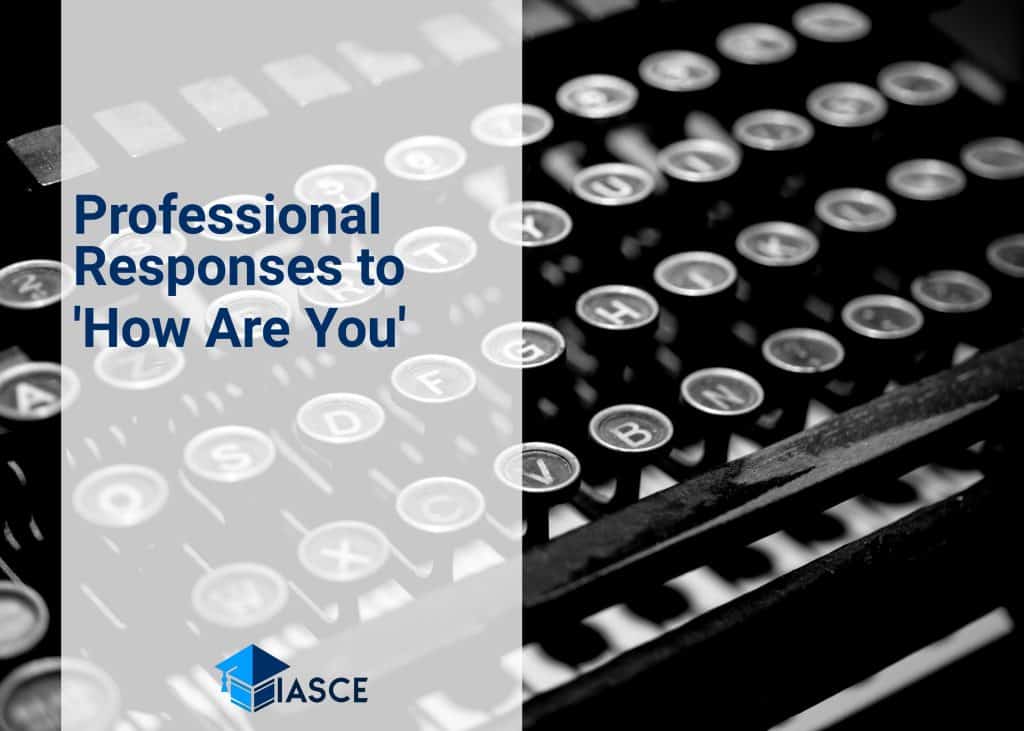How often have you found yourself in a conversational rut, responding to the age-old question “how are you” with a standard “fine,” or “good?” In this linguistic guide, we’ll unravel the art of responding. Formal replies to ‘how are you’ can add depth to your interactions and bring an element of surprise into everyday communication.
I’ve delved into language nuances and cultural norms to compile various formal responses that are both appropriate and interesting. It’s not just about sounding sophisticated – it’s about understanding the subtle layers of conversation and using them effectively.
Ready for a crash course in formal responses? Let’s dive right in! Our journey through conversation etiquette promises to be enlightening, providing you with new ways to express how you’re truly feeling.
Understanding the Etiquette of ‘How Are You’
In our everyday conversations, we often use the phrase “how are you.” It’s so common that we might not even think twice about its origins or proper responses. However, it does have specific etiquette attached to it, and understanding this can enhance our communication skills.
Most people ask “how are you” as a polite greeting rather than an inquiry into your well-being. In response, there’s a set of formal replies that are universally accepted in English-speaking societies. Commonly used affirmative responses include “I’m fine,” “I’m well,” or “I’m good.” Each one is grammatically correct and communicates positive health or mood status.
On the other hand, if things aren’t going great for us, we might feel inclined to give an honest answer like “I’m not doing so well.” But remember, etiquette suggests keeping the conversation light and positive when asked “how are you”. So even if things aren’t perfect at the moment, consider replying with something neutral like “I’ve been better,” or “It’s been a tough day/week.”
However, context matters significantlty in these exchanges. For example:
| Situation | Response |
|---|---|
| When meeting someone new | “Nice to meet you” followed by “I’m good/fine/well” |
| At work with colleagues | A simple “Good morning/afternoon/evening,” regardless of how your day is actually going |
| With close friends/family members | An honest check-in about how you’re feeling |
Ultimately though, whether responding formally or informally to “how are you”, it’s important to be authentic while also being mindful of social norms and expectations.
Remember: language isn’t just about words but also about their connotations and contexts!
Different Ways to Formally Respond to ‘How Are You’
When someone asks, “how are you,” it’s natural to reply with a simple “I’m fine, thank you.” But there’s more than one way to answer this common question. Let’s delve into some formal responses that can add variety and depth to your everyday interactions.
First off, “I’m well, thank you” is a slightly more polished response. It indicates not just physical wellbeing but also emotional wellness. Plus, it’s grammatically correct – ‘well’ being an adverb describing the verb ‘am’.
“I’m doing very well, thank you” is another alternative. This response tends to convey enthusiasm and positivity.
Here are some variations:
- I’m quite well.
- I am in good spirits.
- Things are going smoothly.
- All is well at my end.
These answers let people know you’re doing fine without getting too personal or detailed about your circumstances.
Occasionally, we might find ourselves in challenging situations where we’re not exactly ‘fine’. Even then, it’s possible to respond formally while still being genuine. Examples of such responses could be-
- I’ve been better, but making the most of things.
- Taking each day as it comes.
Being aware of these options gives us the flexibility to express ourselves accurately while keeping the conversation professional and respectful.
Let me show these examples in a table for clarity:
| Inquiry | Response |
|---|---|
| How are you? | I’m quite well |
| How are you? | Things are going smoothly |
| How do you do? | All is well at my end |
| How have you been? | Taking each day as it comes |
Remember that language is a tool for expressing yourself authentically. These formal replies aren’t hard rules – they’re suggestions aimed at helping us communicate more effectively while maintaining decorum during our interactions.
So next time someone asks how you’re doing don’t hesitate giving one of these responses a spin!
Concluding Thoughts on Polite Replies to ‘How Are You’
In the world of language and communication, it’s evident that the simple question “How are you?” carries more weight than one might initially think. It’s not just a query about someone’s well-being; it’s a social lubricant, smoothing the way for further conversation.
Being aware of various polite responses to this universal question can enhance our interpersonal skills. We’ve discussed in detail how answers like “I’m fine, thank you” or “I’m doing well, and you?” sound much more formal and respectful than a casual “Not bad.” A proper response sets an excellent precedent for any ensuing discussion.
Let me clarify here: there isn’t necessarily a ‘right’ or ‘wrong’ answer. The most suitable reply depends heavily on context – who we’re talking to, where we are, what time it is, etc. However, sticking with standard phrases usually doesn’t lead us astray when navigating unfamiliar social territories.
A quick look at some commonly used replies:
| Reply | Context |
|---|---|
| I’m well, thank you | Formal & professional |
| Not too bad | Casual & friendly |
| Can’t complain | Neutral |
This table underlines the idea that our language should adapt according to the situation at hand.
To sum it up: mastering the art of responding politely to “How are you?” can go a long way towards enhancing our communication skills. It shows respect for others while also projecting confidence and poise on our part.
Remember – words have power! They shape perceptions and build relationships. So let’s use them wisely in all aspects of life- be it personal or professional encounters.

